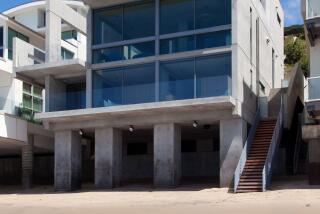So that’s why Chinese buyers snapped up the troubled Malibu Golf Club site

- Share via
There are no golf carts or carefully manicured putting greens left at the twice-bankrupt Malibu Golf Club. Its restaurant and clubhouse have been empty for years.
But that didn’t deter a little-known Chinese investment firm, Shinhan Golden Faith International Development, from paying $30.5 million for the rundown property in an all-cash deal that closed Tuesday.
The 650-acre site in the Santa Monica Mountains was put in receivership after its previous owner, Malibu Associates, defaulted on a $47-million loan it had obtained from U.S. Bank to help pay for a massive makeover. Malibu Associates was founded in 2005 by Dick Fuld, the former head of Lehman Bros.
“We had lots of offers, some with higher prices, but with lots of contingencies,” said Bill Hoffman, chief executive of Trigild, a San Diego property management company appointed by the court to handle the sale. “The Chinese company showed they had the cash and they could perform quickly.”
Not much is known about Shinhan Golden Faith International Development, a Hong Kong-based holding company with shareholders in mainland China, South Korea, Taiwan and Thailand, according to the Panama Papers database.
Hoffman said confidentiality agreements prohibited him from saying much about the firm. Negotiating the deal, which was first reported by the Real Deal, took several months. Principals from the Chinese company visited the 18-hole course twice, though Hoffman did not meet them.
“They have lots of arms and businesses around the world,” Hoffman said. “I’m not sure I know much about them.”
Golf courses are a popular target for Chinese investors looking to diversify their assets overseas. The properties are a relative bargain, thanks to diminishing interest in the sport.
Once acquired, the courses can often be expanded to generate more revenue — as is the case with the Malibu Golf Club, which already has city approval to build guest rooms, a spa and a golf institute.
“Golf courses are increasingly becoming a more popular investment and redevelopment play due to the golf industry bubble bursting and many owners deciding they can no longer make money operating golf courses,” said Michael Soto, an analyst for real estate firm Transwestern.
For Chinese investors, the properties also double as an effective place to stash money to hedge against China’s fluctuating currency and slowing economy.
“It’s still real estate, so you can park your money in that and know it will still be safe,” Soto said. The properties “act as long-term redevelopment sites so overseas investors from China are basically land banking.”
In one of the more recent deals, China Oceanwide Holdings paid $280 million for 26 acres in West Oahu, Hawaii, where it plans to open a golf resort, according to stock filings in Hong Kong.
Oceanwide, whose parent company is based in Beijing, is behind a $1-billion mixed-used development in downtown Los Angeles.
One of the most recognized Chinese forays into golf is through Pacific Links, a company founded by a home improvement store tycoon in China. The company owns or partly owns hundreds of golf courses around the world.
Chinese money has also been pouring into Myrtle Beach, S.C., one of the nation’s premier golf destinations. However, one of the biggest investors in golf courses there, Founders Group International, has reportedly seen its parent company come under investigation in China for fraud.
Once banned under communist rule, golf enjoyed a brief revival in China as an offshoot of the nation’s entrepreneurial success. The sport, however, has been shunned again as one of the spoils of corruption and waste in a country with a shrinking supply of arable land. Authorities have banned construction of new golf courses in China since 2004, though with varying degrees of enforcement.
Real estate and hospitality remain among the primary investment channels for Chinese firms in the U.S., accounting for about one-third of the $15.3 billion in direct investment from China last year, according to Rhodium Group.
Follow me @dhpierson on Twitter
ALSO
SpaceX explosion frustrates both Elon Musk’s and Mark Zuckerberg’s plans
Hanjin bankruptcy disrupts shipping at L.A. and Long Beach ports
Years after falling victim to a Ponzi scheme, Simi Valley retiree wins $15.6-million judgment
More to Read
Inside the business of entertainment
The Wide Shot brings you news, analysis and insights on everything from streaming wars to production — and what it all means for the future.
You may occasionally receive promotional content from the Los Angeles Times.











